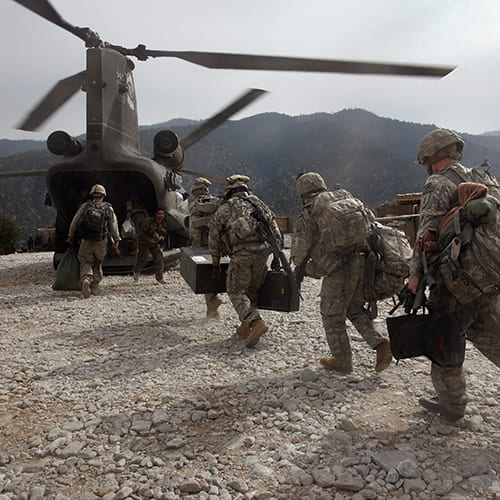Since U.S. troops began leaving Afghanistan in May, a spiraling military, humanitarian and political crisis has left many looking for answers. Joe Barnes, a former career State Department diplomat and now the Baker Institute’s Bonner Means Baker Fellow, provides his perspective in the Q&A below:
What does President Biden’s decision to withdraw from Afghanistan say about him as a leader and a politician?
As a president, the withdrawal proves that President Biden can be decisive and, indeed, ruthless when it comes to foreign policy. He decided to “pull off the bandage” of our Afghanistan intervention. While the public supported withdrawal, powerful elements of the foreign policy and military establishments opposed Biden’s move. As a politician, President Biden calculated that the withdrawal would not substantially harm his popularity.
What was your takeaway from the president’s remarks this week on Afghanistan?
There was some blame-shifting. There was the usual ritual invocation of human rights. But the core of the speech was clear-eyed and unflinching: a Taliban victory in Afghanistan is a price President Biden is willing to pay to end our 20-year-old involvement in an unwinnable war. I agree with him.
In his remarks, Biden said: “We gave them every chance to determine their own future. What we could not provide was the will to fight for that future.” Is that a fair assessment?
I am uneasy with the assessment, if only because it sweeps a complex, evolving situation into a simple statement — and a self-serving one at that. But there is no doubt about this: despite over a trillion dollars in U.S. expenditures and decades of nation-building, the Afghan government and security forces proved to be hollow institutions unable to keep their outnumbered adversaries at bay in a moment of crisis.
Why was the Afghan military so apparently easy for the Taliban to defeat?
It should be noted that Afghan military forces have suffered substantial casualties fighting the Taliban over the course of the war. But the final Taliban offensive met little resistance; during the last month, the Afghan military folded like a house of cards. It may take some time — perhaps years — to come to a definitive understanding of the causes of this collapse.
Did the administration plan for the possibility of a rapid Taliban takeover or was it caught short?
The speed of the Taliban victory surely took the Biden administration by complete surprise. The chaotic scenes at Kabul Airport over the weekend suggest planning was over-optimistic, to say the least.
Will President Biden send a significant number of U.S. troops back to Afghanistan?
Biden has sent more troops to Afghanistan to secure Kabul airport and expedite the departure of American citizens and at least some Afghans who supported us during our long involvement. But this is a short-term expediency. We’re going to be completely out of Afghanistan in relatively short order.
What will Afghanistan be like when the dust settles?
At one level, Afghanistan will be as it has always been: a poor, landlocked country with dim economic prospects and scant strategic importance except for its neighbors. Though the Taliban is clearly trying to portray a more moderate image, it remains a socially reactionary fundamentalist movement. Women and girls, in particular, may be in for some hard – indeed, horrible — times. And the Taliban will no doubt rule with a harsh hand. Our focus right now should be on evacuating Afghans who worked closely with us; we owe an absolute moral obligation to them. We also need to work with other countries to accept potentially large flows of Afghan refugees, including substantial resettlement in the United States. Something to keep an eye on: the possible reemergence of anti-Taliban movements within Afghanistan. The U.S. involvement may be over. But the war could continue.
How will Afghanistan affect Biden’s presidency going forward?
This remains to be seen. Polling in a month or six weeks should tell what impact, if any, the withdrawal has had on his favorability numbers. In the short-term, it is hard to imagine that the Afghan withdrawal – unless events turn even uglier – will significantly diminish Biden’s ability to push legislation.
What are the broader and longer term implications of the U.S. withdrawal for the region? For the U.S.?
We can expect to see China, Russia, India, Iran and Pakistan vie for influence in Afghanistan. The Taliban, if they are wise, will try to extract as much as possible from these regional powers while playing them off against one another. The chief concern for the United States is the possible emergence of anti-American terrorist platforms in Afghanistan; it was, after all, al-Qaeda bases in the country that prompted our invasion in the wake of the September 11, 2001 attacks. There is some talk that our departure will lessen our credibility with other allies. I suspect these concerns are overdrawn, particularly in the cases of our long-term treaty allies like our NATO partners, South Korea and Japan.
